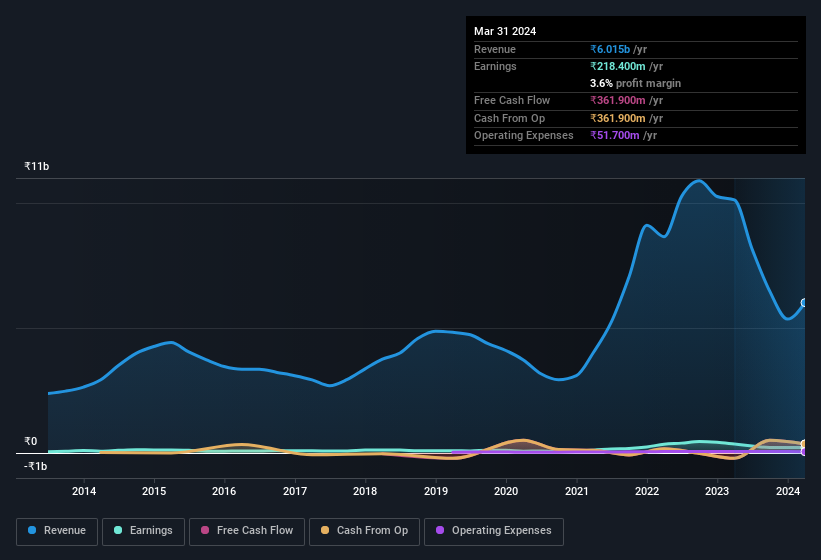- India
- /
- Trade Distributors
- /
- NSEI:VINYLINDIA
Vinyl Chemicals (India)'s (NSE:VINYLINDIA) Conservative Accounting Might Explain Soft Earnings

Soft earnings didn't appear to concern Vinyl Chemicals (India) Limited's (NSE:VINYLINDIA) shareholders over the last week. We did some digging, and we believe the earnings are stronger than they seem.
Check out our latest analysis for Vinyl Chemicals (India)

Zooming In On Vinyl Chemicals (India)'s Earnings
Many investors haven't heard of the accrual ratio from cashflow, but it is actually a useful measure of how well a company's profit is backed up by free cash flow (FCF) during a given period. The accrual ratio subtracts the FCF from the profit for a given period, and divides the result by the average operating assets of the company over that time. The ratio shows us how much a company's profit exceeds its FCF.
As a result, a negative accrual ratio is a positive for the company, and a positive accrual ratio is a negative. While it's not a problem to have a positive accrual ratio, indicating a certain level of non-cash profits, a high accrual ratio is arguably a bad thing, because it indicates paper profits are not matched by cash flow. That's because some academic studies have suggested that high accruals ratios tend to lead to lower profit or less profit growth.
For the year to March 2024, Vinyl Chemicals (India) had an accrual ratio of -0.23. That implies it has very good cash conversion, and that its earnings in the last year actually significantly understate its free cash flow. Indeed, in the last twelve months it reported free cash flow of ₹362m, well over the ₹218.4m it reported in profit. Notably, Vinyl Chemicals (India) had negative free cash flow last year, so the ₹362m it produced this year was a welcome improvement.
Note: we always recommend investors check balance sheet strength. Click here to be taken to our balance sheet analysis of Vinyl Chemicals (India).
Our Take On Vinyl Chemicals (India)'s Profit Performance
As we discussed above, Vinyl Chemicals (India)'s accrual ratio indicates strong conversion of profit to free cash flow, which is a positive for the company. Because of this, we think Vinyl Chemicals (India)'s underlying earnings potential is as good as, or possibly even better, than the statutory profit makes it seem! And on top of that, its earnings per share have grown at an extremely impressive rate over the last three years. At the end of the day, it's essential to consider more than just the factors above, if you want to understand the company properly. So while earnings quality is important, it's equally important to consider the risks facing Vinyl Chemicals (India) at this point in time. Case in point: We've spotted 1 warning sign for Vinyl Chemicals (India) you should be aware of.
This note has only looked at a single factor that sheds light on the nature of Vinyl Chemicals (India)'s profit. But there are plenty of other ways to inform your opinion of a company. For example, many people consider a high return on equity as an indication of favorable business economics, while others like to 'follow the money' and search out stocks that insiders are buying. So you may wish to see this free collection of companies boasting high return on equity, or this list of stocks that insiders are buying.
If you're looking to trade Vinyl Chemicals (India), open an account with the lowest-cost platform trusted by professionals, Interactive Brokers.
With clients in over 200 countries and territories, and access to 160 markets, IBKR lets you trade stocks, options, futures, forex, bonds and funds from a single integrated account.
Enjoy no hidden fees, no account minimums, and FX conversion rates as low as 0.03%, far better than what most brokers offer.
Sponsored ContentNew: Manage All Your Stock Portfolios in One Place
We've created the ultimate portfolio companion for stock investors, and it's free.
• Connect an unlimited number of Portfolios and see your total in one currency
• Be alerted to new Warning Signs or Risks via email or mobile
• Track the Fair Value of your stocks
Have feedback on this article? Concerned about the content? Get in touch with us directly. Alternatively, email editorial-team (at) simplywallst.com.
This article by Simply Wall St is general in nature. We provide commentary based on historical data and analyst forecasts only using an unbiased methodology and our articles are not intended to be financial advice. It does not constitute a recommendation to buy or sell any stock, and does not take account of your objectives, or your financial situation. We aim to bring you long-term focused analysis driven by fundamental data. Note that our analysis may not factor in the latest price-sensitive company announcements or qualitative material. Simply Wall St has no position in any stocks mentioned.
About NSEI:VINYLINDIA
Flawless balance sheet established dividend payer.
Similar Companies
Market Insights
Community Narratives




